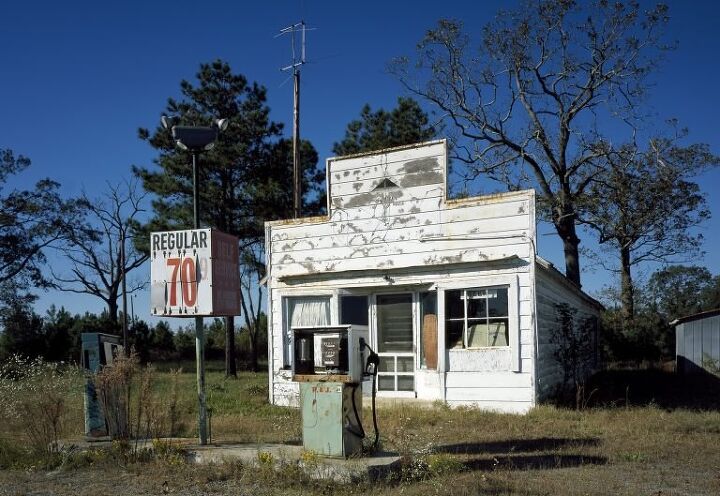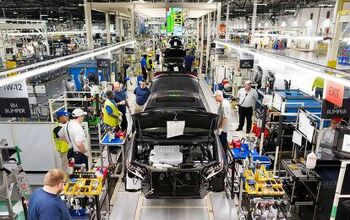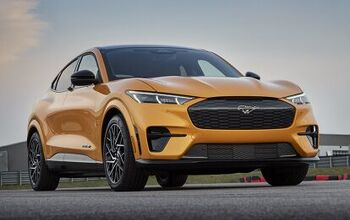Triumph or Tragedy? EPA Officially Sides With Automakers on Fuel Economy Rollback

It looks as if the United States will find out if softened fuel economy targets will transform the domestic market into a haven for automobiles with exquisite powertrains or an antiquated dinosaur with garbage cars making use of old, pollution-friendly tech.
As predicted, the Environmental Protection Agency officially announced its intent to roll back Corporate Average Fuel Economy (CAFE) standards this week. On Monday, EPA head Scott Pruitt indicated his agency would begin the formal regulatory process with the Department of Transportation’s National Highway Traffic Safety Administration (NHTSA) to lower the existing MPG rules.
For the most part, Pruitt avoided diving deep into the NHTSA’s past claims of larger vehicles being safer and the manufacturing pitfalls associated with rushing cutting-edge technology to market — two issues we expected to be addressed. Instead, he left the announcement rather basic by stating the Obama-era rules were “not appropriate and should be revised.” The cornerstone of the EPA’s argument is that Americans simply aren’t buying more efficient automobiles, despite their current availability, and automakers have grown concerned with meeting CAFE standards after 2022.
“The Obama administration’s determination was wrong,” Pruitt said in a statement. “Obama’s EPA cut the midterm evaluation process short with politically charged expediency, made assumptions about the standards that didn’t comport with reality, and set the standards too high.”
Since 2016, much of the automotive industry lobbied to have the regulatory mandate lessened after 2022. Numerous executives discussed the matter with President Trump directly. Roughly a year ago, he agreed to have the EPA reassess the standards — with most observers expecting a rollback as the likely course of action.
With the rollback now confirmed, the next question is “by how much?” Pruitt said the agency will examine what’s feasible and intends to consult with the Department of Transportation. Regardless of the outcome, most automakers should be pleased. The same cannot be said for environmental groups, however.
In a press release published just days before the EPA’s official decision, Sierra Club Executive Director Michael Brune condemned Pruitt as an enemy of the people.
“These roll-backs from Scott Pruitt mean Americans will pay more at the pump while our air gets dirtier, just so Pruitt can help the corporate lobbyists and polluters who give him favors and marching orders,” Brune said. “Pruitt’s decision to side with Ford and the Auto Alliance rather than the overwhelming majority of Americans who want these clean car standards should come as no surprise as this is an administrator who focuses solely on what’s best for corporate polluters, not the public. But make no mistake, we will continue fighting back to protect these standards and the health of our communities. Scott Pruitt can try and hide from the public in first class, in his soundproof office, or in the homes of corporate lobbyists, but we will be loud and clear in calling for our families and our communities to be protected.”
Meanwhile, California is prepared to wage a legal battle against the federal government over the issue. The state says it will absolutely not adhere to lessened fuel economy mandates. During Monday’s announcement, Pruitt said he is considering whether to continue allowing California to set its own vehicle emissions rules or to revoke the state’s waiver. But it doesn’t look good.
“Cooperative federalism doesn’t mean that one state can dictate standards for the rest of the country,” he said. “The EPA will set a national standard for greenhouse gas emissions that allows auto manufacturers to make cars that people both want and can afford — while still expanding environmental and safety benefits of newer cars.”

A staunch consumer advocate tracking industry trends and regulation. Before joining TTAC, Matt spent a decade working for marketing and research firms based in NYC. Clients included several of the world’s largest automakers, global tire brands, and aftermarket part suppliers. Dissatisfied with the corporate world and resentful of having to wear suits everyday, he pivoted to writing about cars. Since then, that man has become an ardent supporter of the right-to-repair movement, been interviewed on the auto industry by national radio broadcasts, driven more rental cars than anyone ever should, participated in amateur rallying events, and received the requisite minimum training as sanctioned by the SCCA. Handy with a wrench, Matt grew up surrounded by Detroit auto workers and managed to get a pizza delivery job before he was legally eligible. He later found himself driving box trucks through Manhattan, guaranteeing future sympathy for actual truckers. He continues to conduct research pertaining to the automotive sector as an independent contractor and has since moved back to his native Michigan, closer to where the cars are born. A contrarian, Matt claims to prefer understeer — stating that front and all-wheel drive vehicles cater best to his driving style.
More by Matt Posky
Latest Car Reviews
Read moreLatest Product Reviews
Read moreRecent Comments
- 28-Cars-Later I'm not sure when it was shot, but I noticed most shots featuring a Ford are pushing the BEV models which haven't sold well and financially kicked the wind out of them. is it possible they still don't get it in Dearborn, despite statements made about hybrids etc.?
- ToolGuy I watched the video. Not sure those are real people.
- ToolGuy "This car does mean a lot to me, so I care more about it going to a good home than I do about the final sale price."• This is exactly what my new vehicle dealership says.
- Redapple2 4 Keys to a Safe, Modern, Prosperous Society1 Cheap Energy2 Meritocracy. The best person gets the job. Regardless.3 Free Speech. Fair and strong press.4 Law and Order. Do a crime. Get punished.One large group is damaging the above 4. The other party holds them as key. You are Iran or Zimbabwe without them.
- Alan Where's Earnest? TX? NM? AR? Must be a new Tesla plant the Earnest plant.


































Comments
Join the conversation
So... what are the new numbers?
Not going to complain as IMHO Obama raised the fuel economy standard to an unreachable level that would have made pretty much every vehicle a "gas guzzler" resulting in a major windfall of gas guzzler taxes for the Feds. Follow the money, people.